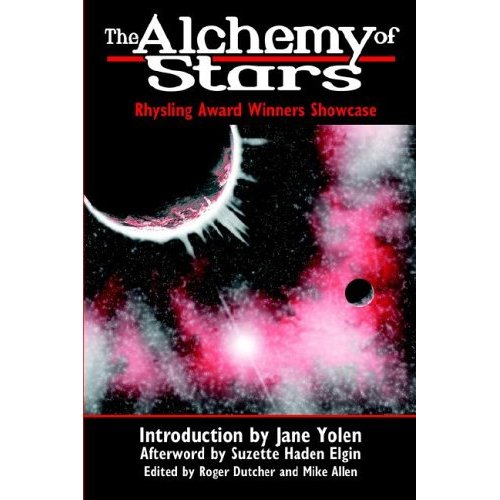Roger Dutcher & Mike Allen, eds.,
The Alchemy of Stars:
Rhysling Award Winners Showcase
reviewed by Danielle L. Parker
 The Alchemy of Stars Publisher: Wildside Press, 2005 Trade paper: 170 pages ISBN: 0809511622 978-0809511624 |
We’re now up to six to eight die-hard, hardcore poetry regulars and about three or four now-and-then attendees. We grew too big for our first location and were asked to leave by the management (although that may have had something to do with ten people banging the table and singing various Kipling ballads at the top of their lungs. Do you know how irresistible those MARCH, MARCH soldier ballads are when you really bellow them?). We even survived the defection of our token male regular — only one other man ever visiting us. Perhaps neither man could have handled hearing mostly middle-aged ladies earnestly declaiming Harold Pinter poems, “f” words intact, not to mention hotly debating Pinter’s decidedly anti-American political views.
In any case, the gals are still going. I’m proud of them. A classic (dead) poet one week, a modern (still kicking) poet the next, and Bring Your Own Poetry the third — we’ve chewed through a lot of poets.
It was in the course of searching for another to feed our voracious appetite for The Modern Muse that I found Mike Allen. He wrote... what? Science fiction poetry? There was such a weird animal? And they even had an association and an award for it?
They do, indeed. It’s the annual Rhysling Award (brownie points for anyone who recognizes the reference without having to look it up). The Alchemy of Stars is a collection of both the long and short poetry winners from the very first (Gene Wolfe, speaking in computer tongues) to its most recent honoree, Mike Allen. After reading Mike Allen’s surrealistic Journey to Kailash, I galloped right over to Amazon and bought both the collection reviewed here and everything Mike Allen has published.
When I tell you delicately that I now count myself a member in the most populous group in my county, that is, the newly unemployed, you’ll realize I was enthused. Ah, but as the funds languish and my cupboard grows bare, I can clutch my poems to my chest, a true lover of the Muse (but don’t worry: while one of those sedentary scary librarians, I gained some pounds that need to go anyway). But enough about me. Let’s get to those poems!
They were a surprise. First, very few of them are actually science related. We have fantasy, surrealism, philosophy and the sheer oddity more than verse that would fit under the awkwardly named umbrella of science fiction poetry. Second, (and wonderfully), many of them buck that annoying trend in modern poetry of me-this, me-that, naval-gazing introspection (I haven’t yet read that epic about the poet picking the zit on the end of his nose, but I’m sure it’s out there). There are actually narrative poems in the collection. Poems that, like “The Lady of Shalott,” tell stories! WOW!
Take, for example, Charles Saplak’s and Mike Allen’s “Epochs in Exile,” which they describe as “A Fantasy Trilogy.” It has great atmosphere (“Baleful sun fires the horizon the quiet sea; one moon/Alone, silvers the jungle at my back. Starfarer no more”), as well as a rather surprising narrator. Another I enjoyed even more is John M. Ford’s “Winter Solstice, Camelot Station,” and there are many more story poems.
Some of the poems are creepy (“Octavia is Lost in the Hall of Masks” for one; “Egg Horror Poem” will put you off your breakfast). Others take Earthlings to task in various ways (“Flight is for Those Who Have Not Yet Crossed Over” and “dear spacemen” are two). A few are comic or charming (“Spotting UFOs While Canning Tomatoes,” for example).
We even have poems that buck the modern non-rhyming trend (“For the Lady of a Physicist,” one of my personal favorites, compares love to the pull of a black hole: “Therefore, I have become for her/A dark, entropic murderer”). The preponderance of non-rhyming verse in modern poetry once caused a hot argument in my group about what really separates poetry from prose. We finally wore down the die-hards who insisted It Ought To Rhyme, but still, how refreshing to see real craft in a modern poem.
In short, if you, unlike me, have pennies left in the bank, go out and buy this collection. Science Fiction Poetry is a dreadful conglomerate name that no doubt purists sneer at, but the poetry collected here isn’t awkward. And while you’re at, check out more Mike Allen. That guy’s good.
Copyright © 2008 by Danielle L. Parker

